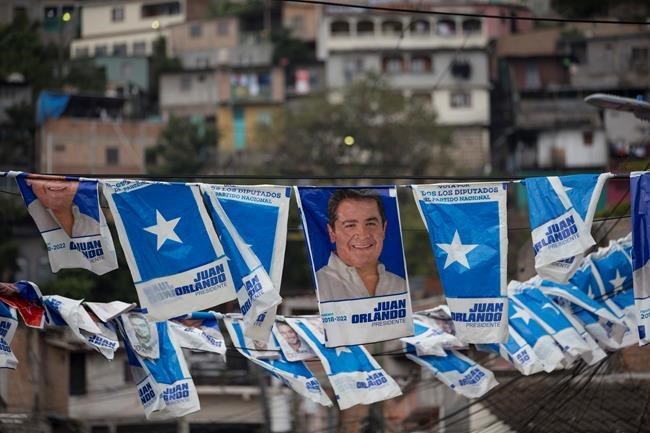
Banners with a portrait of Honduran President and current presidential candidate Juan Orlando Hernandez hang outside a polling station during the general elections in Tegucigalpa, Honduras, Sunday, Nov. 26, 2017. Hernandez tries to win a second term despite opposition claims that his re-election is an unconstitutional power grab. (AP Photo/Moises Castillo)
Republished November 26, 2017 - 8:52 PM
Original Publication Date November 26, 2017 - 6:26 AM
TEGUCIGALPA, Honduras - Hondurans waited anxiously with no results released hours after polls closed for Sunday's presidential election, while both the president and his main challenger claimed victory after what appeared to be a heavy turnout by voters.
Election authorities urged calm late Sunday while the ballots were tallied, but gave no time estimate for when results might be reported.
Analysts speculated the lateness of the count could indicate an unexpected tight race after a campaign in which President Juan Orlando Hernandez was considered a strong favourite.
"The situation is critical," sociologist Julio Navarro said. "The (electoral) court's message is that the results are close."
As votes were being counted, Hernandez, a conservative U.S. ally, was the first of the race's nine candidates to sing victory. "We won this election," he told supporters.
Salvador Nasralla, the candidate of the leftist Alliance of Opposition Against Dictatorship, quickly claimed victory for himself.
Both candidates said they based their claims on polling of voters during the day. Turnout appeared to be heavy across the country, with relatively minor irregularities reported.
The other main candidate, Luis Zelaya, a middle-of-the-roader representing the traditional Liberal Party, opted for caution and made no comments after cancelling a news conference. There were six more candidates from tiny opposition parties.
Hernandez built his support on popularity largely on a drop in violence in this impoverished Central American country, whose homicide rate was once among the world's worst. Honduras' National Autonomous University says the rate has dropped to 59 homicides per 100,000 people from a dizzying high of 91.6 in 2011.
But corruption and drug trafficking allegations cast a shadow over his government.
And his re-election bid fueled charges that the president's National Party was seeking to entrench itself in power by trampling the country's institutions with court approval for the president to seek a second term.
Fears of just that sort of consolidation — but by a leftist rival allied with Venezuela — led Hernandez's party to back a military coup in 2009 against a president it accused of plotting to violate Honduras' seemingly iron-clad constitutional ban on re-election.
The country's highest court backed the 2009 ouster of President Manuel Zelaya. But the current court is packed with Hernandez' supporters and it ruled in 2015 that the constitutional ban was overridden by a citizen's right to seek re-election.
"Here in Honduras there is no democracy; there is a dictatorship," Zelaya told The Associated Press late Saturday. "The hypocrisy of the Honduran elite is evident ... the people will have to decide at the ballot box."
In addition to people in Honduras, tens of thousands of Hondurans were eligible to cast ballots in seven U.S. cities: Atlanta, New Orleans, New York, Los Angeles, Miami, Houston and Washington.
Sunday's general elections were the 10nth in Honduras since the country returned to democracy in 1980 after almost two decades of military regimes.
Despite his popularity, Hernandez had a weak spot in the perception of corruption.
A convicted drug trafficker testified in a New York courtroom this year that he met with Hernandez's brother Antonio to get Honduras' government to pay its debts to a company that the trafficker's cartel used to launder money. Devis Leonel Rivera Maradiaga, ex-leader of the cartel known the Cachiros, testified that Antonio Hernandez asked him for a bribe in exchange for government contracts. The brother has denied that allegation.
And in September, the son of a former president from Hernandez's party, Porfirio Lobo was sentenced in New York to 24 years in prison after revealing his role in a cocaine trafficking conspiracy. Fabio Lobo, 46, pleaded guilty in May 2016, admitting he worked with drug traffickers and Honduran police to ship cocaine into the United States.
News from © The Associated Press, 2017